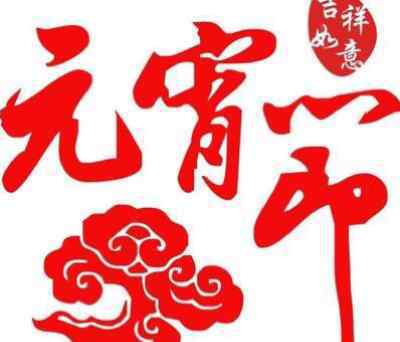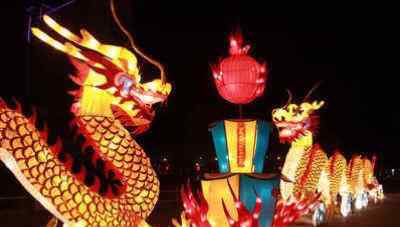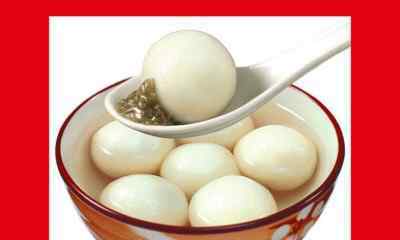作为中华民族一大传统节日,元宵之夜,大街小巷都会张灯结彩,人们会赏灯、猜灯谜、吃汤圆……将从除夕开始延续的庆祝活动推向又一个高潮。
今天,就和大家聊聊,元宵节里几大世代相沿的习俗,用英语怎么说!

 正月十五吃元宵,在我国是由来已久习俗。人们在元宵节吃汤圆,实际上是思念亲人、渴望团圆的意思。
正月十五吃元宵,在我国是由来已久习俗。人们在元宵节吃汤圆,实际上是思念亲人、渴望团圆的意思。Eating Tangyuan is an important tradition for the Lantern Festival. Tangyuan, also know as yuanxiao, is a Chinese food made from glutinous rice flour mixed with a small amount of water to form balls and is then cooked and served in boiling water.
吃汤圆是元宵节的一项重要习俗。汤圆,又名"元宵",是由糯米粉等做的球形食品,一般有馅料,煮熟带汤吃。
Traditionally, the balls come stuffed with sweet black sesame paste, although the fillings can vary. Tangyuan are eaten during Lantern Festival because of a homophone for union.
通常用黑芝麻做馅,但又不仅限于黑芝麻。据说元宵象征合家团圆美好,吃元宵意味着新的一年合家幸福、团团圆圆,所以正月十五元宵必备。
Decorating and hanging lanterns is the main tradition of the festival, with lanterns big and small hung around households, parks, streets and other public spaces. Red lanterns of various shape and type will attract countless visitors to watch.
正月十五赏花灯是元宵节必有的另一项习俗。人们把大大小小的花灯悬挂于家门口、公园、街道或者其他公共场所。各式各样的红灯笼将会吸引无数的游客前来观赏。Solving riddles on lanterns has been a popular tradition since the Song Dynasty. People write riddles on paper and stick them to the lanterns and if someone guesses correctly, they can pull the riddle off. The notes often contain messages of good fortune and wishes.
从宋代开始,猜灯谜就是一项非常受欢迎的民俗活动。人们把谜语写到纸上并悬之于灯,供人猜射。通常,谜底都是各种吉祥话和祝福。
The lion dance is one of the oldest traditions to celebrate the Chinese New Year. In ancient times, people regarded the lion as a symbol of bravery and strength and believed the dance could drive away bad fortune to protect people and their livestock. The custom has continued to the modern day and lion dances are performed at important events on the Chinese calendar, such as the Lantern Festival, to bring good luck.
舞狮子是另一项庆祝新春的古老习俗。在古代,人们把狮子作为勇气和力量的象征,认为舞狮可以消灾降福。所以舞狮子的传统就延续至今,并且每逢佳节或庆典,如元宵节都会以舞狮子来祈求好运。Dragon dance is a form of traditional dance and performance in Chinese culture. Like the lion dance it is most often seen in festival celebration. The dance is performed by a team of dancers who manipulate a long flexible figure of a dragon using poles positioned at regular intervals along the length of the dragon.
舞龙灯是中国独具特色的民俗活动。与舞狮子一样,每逢佳节,人们都要耍龙灯。表演者由数十人组成,每人用一杆间隔支撑起一条长龙。
Chinese dragons are a symbol of China, and they are believed to bring good luck to people, therefore the longer the dragon in the dance, the more luck it will bring to the community.
龙是中国的象征,相传龙能够带来吉祥和好运。耍的龙灯越长,就越能给当地人民带来好运。因此,每逢春节、元宵节,人们都会举行耍龙灯的活动。Walking on stilts, or Cai Gaoqiao, is another popular traditional performance for the Lantern Festival, especially in Northern China. According to the archives, our Chinese ancestors began using stilts to help them gather fruits from trees. This practical use of stilts gradually developed into a kind of folk dance.
踩高跷是元宵节的另外一项重要民俗,尤其是在北方地区。根据记载,我们的祖先踩高跷是为了从树上摘果子。之后,高跷就发展成为一种群众性技艺表演艺术。

1.《lantern怎么读 元宵节习俗用英语怎么说?》援引自互联网,旨在传递更多网络信息知识,仅代表作者本人观点,与本网站无关,侵删请联系页脚下方联系方式。
2.《lantern怎么读 元宵节习俗用英语怎么说?》仅供读者参考,本网站未对该内容进行证实,对其原创性、真实性、完整性、及时性不作任何保证。
3.文章转载时请保留本站内容来源地址,https://www.lu-xu.com/shehui/325380.html